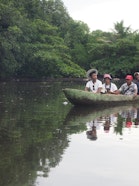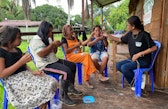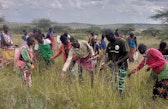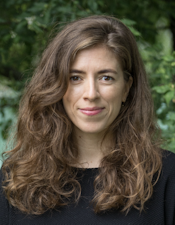Learning to Lead Through Listening
Project Update
Publish date: June 8, 2025

Learning to Lead Through Listening
Project Update
Publish date: June 8, 2025
2025 Program
The Changemakers Program 2025 is officially underway, and in May, the new cohort began their journey with focus, collaboration, and a shared commitment to understanding the root causes of the problems. This year’s group convenes inspiring young leaders from Kenya, Madagascar, and Peru, each working on complex local challenges ranging from land degradation and youth empowerment to education, mental health, and cultural preservation.
From Discovery to Definition: A Deep Dive into Design Thinking
The first month of the program introduced Changemakers to the Design Thinking methodology, beginning with the discovery phase. They learned to pause before solving, step into their communities' realities, and gather meaningful insights through interviews, immersions, and observations. A key milestone was the transition to the define phase, where Changemakers learned to map user experiences using empathy maps, customer job frameworks, and journey mapping tools. These methods help identify functional challenges and the emotional and social drivers behind them. Each participant is now building exploration plans and insight maps to clarify the problem they will address throughout the program.
Mentoring Rooted in Context and Culture
Beyond methodology, Changemakers participated in region-specific mentoring and coaching sessions, each tailored to the local challenges and priorities of their group.
Madagascar
The community empowerment mentoring session opened with storytelling. Participants shared deeply personal insights into their projects, from eco-tourism and sustainable fashion to digital access and women’s empowerment. Conversations addressed cultural barriers, like gender norms around technology, and the need for trust in partnerships. Facilitators offered support not just in strategy, but in navigating vulnerability, setbacks, and resilience.
Peru
The land restoration mentoring session explored how conservation, Indigenous rights, and community well-being are closely connected. Projects ranged from transforming banana waste into jewelry to mapping illegal land use and reclaiming traditional materials. Changemakers spoke of reviving ancestral knowledge, fostering youth engagement, and restoring dignity through sustainable practices. The session reinforced that environmental justice is inseparable from cultural and emotional well-being.
Kenya
In Kenya, the land restoration mentoring session centered on practical, land-based challenges: bare soils, livestock pressure, and water scarcity. Participants reflected on how land degradation drives conflict and how traditional knowledge can offer restoration pathways. From gum arabic trees production to reseeding initiatives, Changemakers explored how ecological restoration can also support food security, peace-building, and women’s leadership. The facilitator guided the session with a calm and reflective approach, inviting participants to pause, check in with themselves, and explore both the technical and emotional dimensions of their work.
Ongoing Learning: Live and Asynchronous Sessions
In parallel to live mentoring, Changemakers continued their learning journey through self-study assignments to reinforce the session’s takeaways. These included:
Completing empathy maps and identifying the functional, emotional, and social needs of their community stakeholders
Drafting customer journey maps to visualize how problems affect individuals before any solution is introduced
Participating in async feedback threads and resource-based exercises to deepen understanding of user needs
This combination of live interaction and self-paced work is helping each participant build a solid foundation rooted in empathy, systems thinking, and cultural context.
From Understanding to Framing the Challenge
In June, Changemakers will shift from insight-gathering to defining the core problems they want to solve. This involves distilling what they’ve learned into a focused challenge that reflects both the urgency of their context and the possibility for sustainable impact.
Upcoming sessions will focus on:
Framing clear problem statements
Practicing storytelling techniques to communicate their work
Engaging in expert Q&As on environmental conservation and policy advocacy
Turning Insights Into Action
From early research to problem definition, from peer learning to expert mentoring, the 2025 Changemakers are already putting their ideas into practice. As the program evolves, we’ll continue sharing stories from across the regions, highlighting the lessons, challenges, and wins that shape this cohort’s path.
This journey isn’t just about learning, it’s about leading, together.


Team
- Project contact
Project contact
Emine Ertugrul
Engagement Specialist
